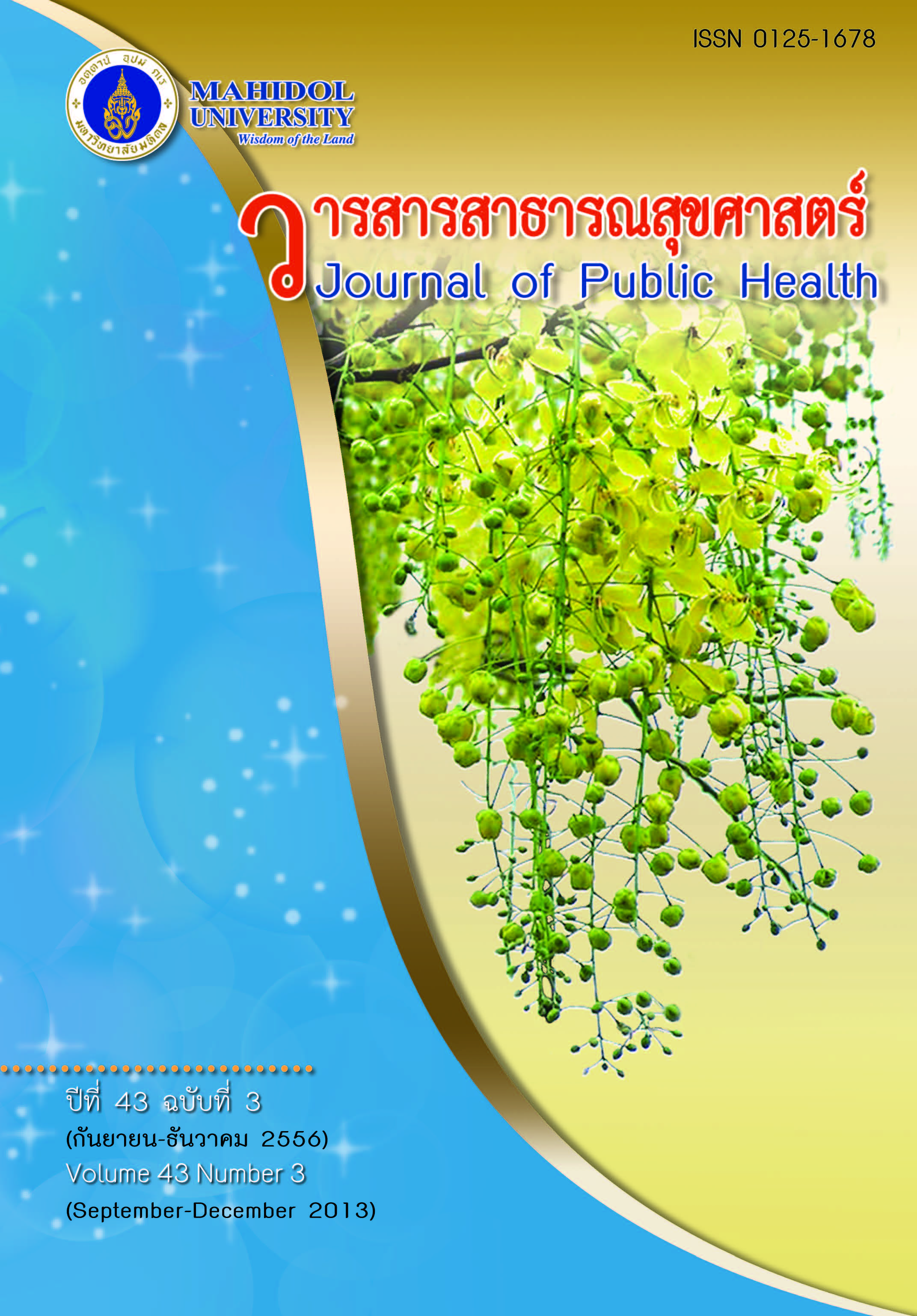การพัฒนาศักยภาพของอาสาสมัครสาธารณสุข และเครือข่ายสุขภาพระดับตำบลในการดำเนินงานป้องกันและควบคุมเอดส์ ตำบลบ้านต๊ำ อำเภอเมือง จังหวัดพะเยา
Keywords:
การวิจัยปฏิบัติการ, การป้องกันและควบคุมเอดส์, อาสาสมัครสาธารณสุขและเครือข่ายสุขภาพ, การสร้างพลัง,Abstract
บทคัดย่อ
การศึกษาครั้งนี้เป็นการวิจัยเชิงปฏิบัติการ (Action research) เพื่อประเมินประสิทธิผลของโปรแกรมการประยุกต์การสร้างพลังในการพัฒนาศักยภาพของอาสาสมัครสาธารณสุขและเครือข่ายสุขภาพระดับตำบลในการดำเนินงานป้องกันและควบคุมปัญหาเอดส์ในชุมชน ตำบลบ้านต๊ำ อำเภอเมือง จังหวัดพะเยา ประยุกต์ใช้กระบวนการสร้างพลัง(Empowerment Process) และการมีส่วนร่วมของชุมชนในการพัฒนาศักยภาพ ประชากรที่ศึกษาคือ อาสาสมัครสาธารณสุขและเครือข่ายสุขภาพระดับตำบลบ้านต๊ำ อำเภอเมือง จังหวัดพะเยา จำนวน 60 คน เลือกกลุ่มตัวอย่างแบบเจาะจง (Purposive Selection) ใช้กระบวนการสร้างพลังที่ผู้วิจัยสร้างขึ้น 12 สัปดาห์ เครื่องมือในการพัฒนาศักยภาพ มี 2 ขั้นตอน คือ การอบรมเชิงปฏิบัติการ การวิเคราะห์ปัญหาเอดส์ในชุมชน และการปฏิบัติตามแผนงาน ติดตามและประเมินผลการดำเนินงาน ใช้วิธีการเชิงคุณภาพและเชิงปริมาณเป็นเครื่องมือ ข้อมูลเชิงคุณภาพนำมาวิเคราะห์เนื้อหาตามกรอบและประเด็นที่สำคัญที่สะท้อนให้เห็นความหมาย และคุณค่าของกระบวนการพัฒนาศักยภาพ และข้อมูลเชิงปริมาณให้กลุ่มตัวอย่างตอบแบบสอบถามด้วยตนเอง ได้ค่าความเชื่อมั่น 0.65 ข้อมูลมาวิเคราะห์ด้วยสถิติ ร้อยละ, ค่าเฉลี่ยเลขคณิต,ค่าเบี่ยงเบนมาตรฐาน, Student’s t-test, Paired t-test ผลการวิจัยพบว่า ภายหลังการทดลองกลุ่มตัวอย่าง มีการเปลี่ยนแปลงการรับรู้เกี่ยวกับเอดส์ ทัศนคติทางบวกต่อผู้ติดเชื้อเอดส์และผู้ป่วยเอดส์ ความคาดหวังในความสามารถตนเองและการนับถือและเห็นคุณค่าตนเองในการดำเนินงานป้องกันและควบคุมเอดส์เพิ่มขึ้น โดยเปลี่ยนไปอย่างมีนัยสำคัญทางสถิติที่ระดับ a= 0.05 สามารถกำหนดนโยบาย วางแผนงาน ดำเนินงานตามแผน กำหนดผู้รับผิดชอบและติดตามประเมินผล ได้รูปแบบการดำเนินงาน จำนวน 6 โครงการ ใช้ปัญหาที่เกิดขึ้นจริงในชุมชน ร่วมกันแลกเปลี่ยนความรู้ภายในกลุ่ม ทำให้ประชาชนเกิดความตื่นตัวและเห็นความสำคัญของการป้องกันและควบคุมเอดส์มากยิ่งขึ้น ประชาชนส่วนใหญ่มีความพึงพอใจและร่วมมือในการดำเนินโครงการที่เกิดขึ้นในชุมชนเป็นอย่างดี บทเรียนที่ได้รับจะเป็นประโยชน์โดยตรงต่อชุมชน สามารถนำไปประยุกต์ใช้กับอาสาสมัครสาธารณสุขได้อย่างต่อเนื่อง
Development of Health Volunteer and Sub-District Network Potentiality on AIDS Prevention and Control in Bantum Sub-District, Muang District, Phayao Province
ABSTRACT
This study was conducted using the action research and aimed to assess the effectiveness of a program for developing health volunteer and sub-district network potentiality on AIDS prevention and control in Bantum Sub-district, Muang Distrit, Phayao Province. The significant strategies used for development were empowerment processes and community participation. The study populations group was composed of 60 health volunteers and network in Bantum Sub-district, Muang Distrit, Phayao Province, were purposively selected in this study. The empowerment processes were implemented with the study group for 12 weeks, conducted during between April to June 2012. The empowerment processes were composed of 2 stages: analyzing the problems regarding AIDS in a community; implementing monitoring and evaluating the action plans. In each implementation stage qualitative and quantitative methods were used for data collection. For the qualitative data, the content analysis was made according to a framework and key themes that reflected the meanings and values of the empowerment. The quantitative data were analyzed by using a self-administered questionnaire the reliability coefficient is 0.65 and analyzed by computing percentage, mean, standard deviation, Student’s t-test and Paired sample t-test.The results of the study showed that after development health volunteer and sub-district network potentiality significantly positive changes were found in perception on AIDS, attitude towards the patients of AIDS and HIV+, self-efficacy, self-esteem, and ability on management of AIDS prevention and control (p<0.05). The volunteers were able to formulate policies, plans, implementation, and evaluation their 6 prevention and control of project in relations to the community-based problems that increases knowledge sharing. The effectiveness of the program was community people that significantly perceived and implemented of AIDS prevention and control program in their own communities. They were satisfied with the program and gave good cooperations to the AIDS prevention and control program. The lessons learned on development of power and potential will be directly useful for communities and may be applied to other health volunteers.
Downloads
Issue
Section
License
Creative Commons License CC-BY-ND


